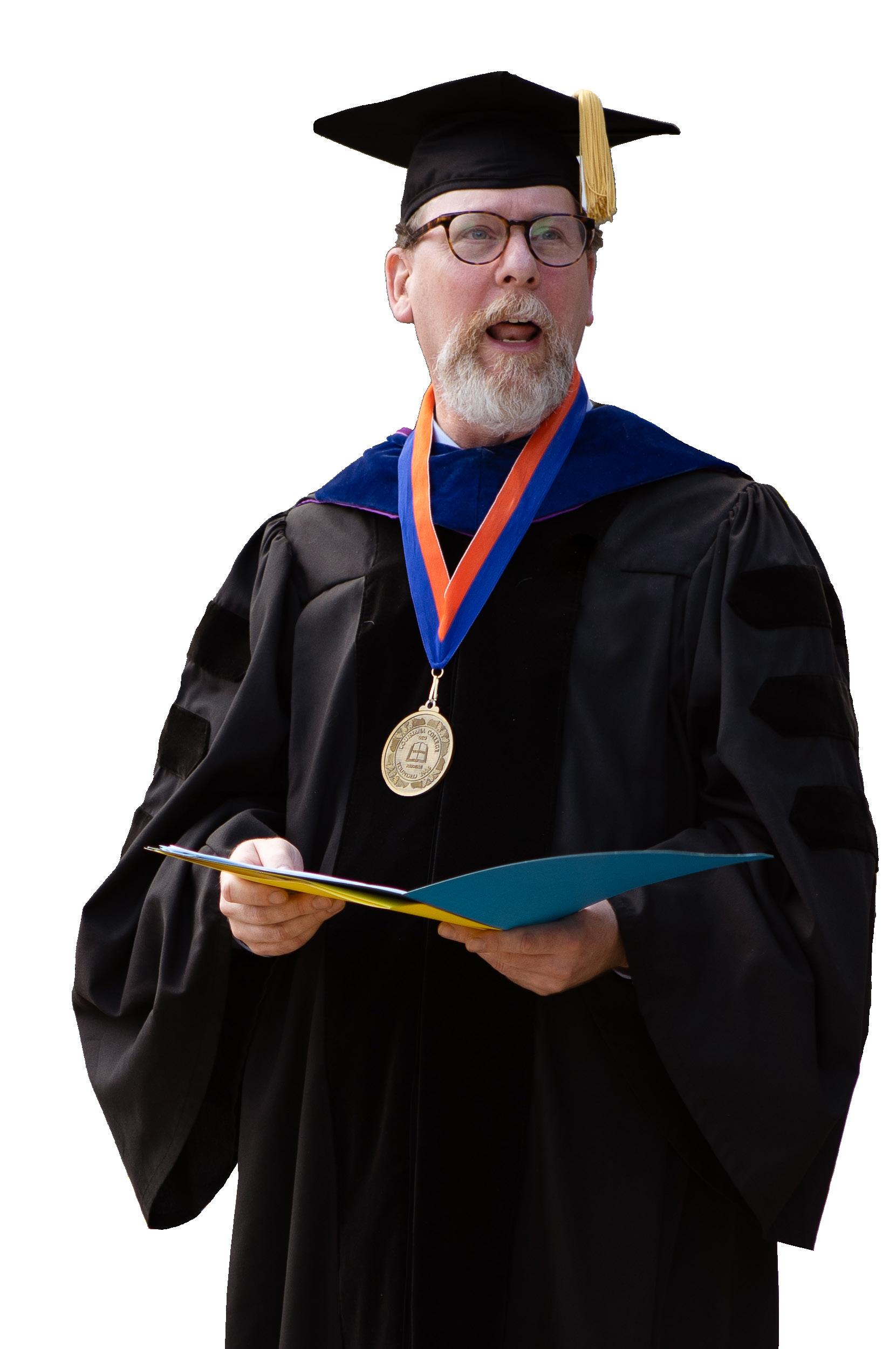
6 minute read
New Worship Arts and Production degree announced
By Elizabeth Clarke
The Department of Music is pleased to announce a new degree program beginning Fall 2023: a Bachelor of Arts with an Emphasis in Worship Arts and Production.
Advertisement
This degree is designed to prepare majors to be successful in music ministry, both during and between church services.
“In addition to receiving instruction of core music knowledge and ministry, coursework includes specialized classes that prepare students to work with musicians in worship contexts,” said Jacob Wittkopp, chair of the Division of Fine Art. “Students will gain experience working with sound equipment, recording and editing with digital music software, and creating digital music media.”
This degree program is unique from previous programs in that it equips students to use music technology and to implement multiple facets of music production, which are becoming increasingly valuable skills in a 21st-century landscape. The degree is an ideal fit for those who seek to lead church ministry, be involved with live sound and production, or to those seeking to become more involved with digital and recorded music media.
Media Production Associate Professor Jeff Young said almost every church has transitioned into the electronic age of worship. This degree will enable students to be well-versed in lighting, sound, graphics, and video production.
“When a student learns to direct music and couples it with an understanding of the technical arts, there is a higher opportunity of success in the local church,” Young said.
To create this degree, LCU invited input from worship leaders. Caleb Willis, a 2016 LCU graduate and worship minister at Fairview Baptist Church in Alpha, served on the advisory committee.
“There is a great need to raise up a new generation of worship leaders,” Willis said. “We are praying that God would use this program to equip a wide range of churches that exist in our state,” Willis said. “From the faithful country church to the sprawling urban church, we need leaders that will challenge people to worship with their heart, soul, mind, and strength.”
President Dr. Rick Brewer said LCU’s Worship Arts and Production program will equip future worship leaders with the requisite skills to effectively respond to the needs of the local church today and into the future.
“We have intentionally designed this program to offer a solid blend of technology, music, and theology amplifying our commitment to academic excellence in a Christ-centered environment,” Brewer said. “Church leaders can confidently send future worship leaders to LCU for relevant training and spiritual development.”
For more information about this program, visit us online at LCUniversity.edu/music
By

Louisiana Christian University celebrated its annual fall Founder’s Day Chapel on Tuesday, Nov. 8, with a historical marker unveiling in honor of the Richard W. Norton Memorial Library.

“In the early 1950s almost 70 years ago, two members of the Norton family of North Louisiana, Mrs. Richard W. Norton Jr. and Mrs. Nellie Norton Smitherman, both ladies from Shreveport, gifted substantial funds for the construction of the first free-standing library on our campus,” said LCU President Dr. Rick Brewer. “Construction finished in time for the 1955-56 academic year.”
LCU’s library is named for a 19th-century Baptist minister, Richard W. Norton, whose descendants wanted him honored for his tireless work in the Baptist faith, said Dr. Henry Robertson, professor of history. Norton received a college education in Virginia and at Furman College in Greenville, South Carolina. Norton accepted Jesus Christ as his Lord and Savior and preached the word in churches across Virginia, South Carolina, Kentucky, Tennessee, and Texas.
During the first years of his ministry, he comforted Southern soldiers during the Civil War as chaplain for a Tennessee regiment. He helped soldiers at hospitals with their letters home, and blessed those who were marching off in the line of battle with a near certainty of death hanging over their heads Following his war service, Norton’s ministry stretched for decades and away millions of dollars to create important places. One of the most significant, the R.W. Norton Art museum located in Shreveport remains a fantastic repository of treasured pieces of world-class painting and sculpture. “That museum and our library are the most important testaments of a desire of the Nortons to endow the world with improvements in the quality of life for all Louisianans,” Robertson said. “What they did there and here in Pineville was truly transformational. We are especially grateful for our library and the Norton’s belief in liberal arts Christian higher education.”
The Louisiana Baptist Convention and several churches also provided funding for the Norton Library, which was designed by architect J. Cheshire Peyton, of Shreveport, and built by Tudor Construction of Pineville.
“The Tudor family has been an integral part of this university from our beginnings in 1906 and now for over a century,” Brewer said. “Their donations, construction excellence, and service have given us the Library masterpiece and several additional campus buildings over the decades.”
Robertson smiled as he mentioned the main reasons the library was so popular when it first opened wasn’t just the much larger space for over 300,000 books, rather it was also the new amenity of air-conditioning.
“In 1955, an air-conditioned space became a popular place for anyone to visit in our humid subtropical climate,” he said.
By Elizabeth Clarke
Why does God allow babies to die?
Why do Christians suffer from cancer or die from COVID?
These are questions believers struggle with understanding why a good God allows pain. And they are also used by atheists to deny that God even exists.
Christian apologist Frank Turek spoke on “If God, Why Evil?” at Louisiana Christian University’s final Christ-Church-Culture event of the semester Monday night and explained why evil is actually evidence of God.
“Why does He allow those who love Him to suffer?” Turek asked. “Why believe in this being?”
Turek specifically addressed:
Does evil disprove God?
What’s the purpose of evil?
What’s God’s solution to evil?
While going through tragedy, Turek said, nothing makes sense or will make the pain go away, but it is evil that proves there is good.
“God is the standard of good that proves evil does exist,” he said. “There’s got to be an external standard for us to see that something doesn’t measure up.”
The reason God allows evil is because He created humans with free will.
“He gave us free will so we can do good, but because of that we can also do evil,” Turek said.
When humans are doing well and prospering, they often forget about God, but suffering develops character, he said. If humans got everything they wanted, they would be ruined and spoiled.
“We need difficulty in our lives,” Turek said. “With it we become more like Jesus.”
He said difficulties can make us better, or they can make us bitter.
Humans don’t have the perspective to understand the reason for all the calamites they face, he said, but God is outside of time and knows the purpose or end result of each individual trial or disaster that happens.
It’s the Ripple Effect, and God sees the whole picture. About a dozen attendees asked questions following Turek’s talk.

Phoebe Lim, a junior public relations major, asked if humans really had free will if they were already pre-destined to spend eternity in heaven or hell.
Turek explained that “knowing something is going to happen is not the same as causing it. God knows what’s going to happen because He is outside of time.”
He used the example of the sun rising in the morning—just because we know the sun will rise tomorrow does not mean we cause it to rise.
Selena Torres, a junior music major, asked him how he would respond to a person who says God is a manmade idea.
Turek said the evidence for God is everywhere, and he would ask the person what evidence he or she has.
“Virtually every single culture in history has believed in some kind of God,” Turek said. “Why? Because we believe in cause and effect.”
Turek’s new book “Stealing from God: Why Atheists Need God to Make Their Case” provides evidence to show how atheists
Addressing cultural issues with a Biblical perspective

By Kai Stone, Wildcats Media
That is what Louisiana Christian University’s C3 – Christ, Church, Culture – events bring to the campus each semester.
This fall, LCU brought in two speakers, Ricky Chelette and Dr. Mark Turman.
Living Hope Ministries Founder Ricky Chelette was the first C3 speaker of the Fall, 2022 semeste. His message to LCU students was both timely and even a little provocative as he focused on the Biblical view of marriage and the belief that Christ is the only answer to those who struggle with same-sex attraction.
Chelette says that he meant for his message to be both timely and full of hope for those who are struggling with sexual identity issues. He shared his own personal story of having been sexually abused for 12 years and ultimately, God delivering him from both the abuse and his own suicide attempt.
A week later, LCU’s C3 continued with Dr. Mark Truman, the executive director of the Denison Forum, a website that offers news of the day from a Christian perspective. Turman’s message was more focused on the Christian’s role in today’s culture war as he attempted to better define the nature of the Christian life.
Turman talked about his upbringing and how he didn’t become a Christian until being witnessed to by several of his friends. His challenge to the students was to live their faith in front of others who might not believe.
The C3 series was started by LCU President Dr. Rick Brewer, who said it important for students to be challenged to think of the major issues of the day from a Christian perspective.

You can find past speakers from LCU’s C3 series by visiting the school’s website!










